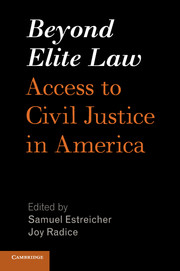Book contents
- Frontmatter
- Contents
- Beyond Elite Law
- Foreword
- List of Contributors
- Overview
- Overview
- PART I CURRENT STATE OF ACCESS TO LEGAL SERVICES
- PART II SOURCES OF LEGAL SERVICES ASSISTANCE FOR WORKING AMERICANS
- PART III FASHIONING A REFORM AGENDA
- 23 New York State Task Force to Expand Access to Civil Legal Services
- 24 New York's 50-hour Pro Bono Requirement
- 25 Starting a “Low Bono” Law Practice
- 26 Toward a More Effective and Accessible Solo and Small Firm Practice Model
- 27 Facilitating Homemade Wills
- 28 Court Facilitation of Self-Representation
- 29 Limited Representation and Ethical Challenges
- 30 Technology Can Solve Much of America's Access to Justice Problem, If We Let It
- 31 Mediation of Employment Disputes at the EEOC
- 32 AAA Consumer Arbitration
- 33 Saturns for Rickshaws: Lessons for Consumer Arbitration and Access to Justice
- 34 Employment Arbitration in the Securities Industry
- 35 FINRA Arbitration and Employment Disputes
- 36 Arbitration as an Employee-Friendly Forum
- 37 Access to Justice in Employment Arbitration: a Critical Look
- 38 Collaborative Technology Improves Access to Justice
- 39 Union Representation in Employment Arbitration
- 40 Legal Representation for New York City's Chinese Immigrant Workers
- 41 Reassessing Unauthorized Practice of Law Rules
- 42 The Pyett Protocol: Collectively-Bargained Grievance Arbitration as a Forum for Individual Statutory Employment Claims
- PART IV CREATING A CULTURE OF SERVICE
- Index
39 - Union Representation in Employment Arbitration
from PART III - FASHIONING A REFORM AGENDA
Published online by Cambridge University Press: 05 May 2016
- Frontmatter
- Contents
- Beyond Elite Law
- Foreword
- List of Contributors
- Overview
- Overview
- PART I CURRENT STATE OF ACCESS TO LEGAL SERVICES
- PART II SOURCES OF LEGAL SERVICES ASSISTANCE FOR WORKING AMERICANS
- PART III FASHIONING A REFORM AGENDA
- 23 New York State Task Force to Expand Access to Civil Legal Services
- 24 New York's 50-hour Pro Bono Requirement
- 25 Starting a “Low Bono” Law Practice
- 26 Toward a More Effective and Accessible Solo and Small Firm Practice Model
- 27 Facilitating Homemade Wills
- 28 Court Facilitation of Self-Representation
- 29 Limited Representation and Ethical Challenges
- 30 Technology Can Solve Much of America's Access to Justice Problem, If We Let It
- 31 Mediation of Employment Disputes at the EEOC
- 32 AAA Consumer Arbitration
- 33 Saturns for Rickshaws: Lessons for Consumer Arbitration and Access to Justice
- 34 Employment Arbitration in the Securities Industry
- 35 FINRA Arbitration and Employment Disputes
- 36 Arbitration as an Employee-Friendly Forum
- 37 Access to Justice in Employment Arbitration: a Critical Look
- 38 Collaborative Technology Improves Access to Justice
- 39 Union Representation in Employment Arbitration
- 40 Legal Representation for New York City's Chinese Immigrant Workers
- 41 Reassessing Unauthorized Practice of Law Rules
- 42 The Pyett Protocol: Collectively-Bargained Grievance Arbitration as a Forum for Individual Statutory Employment Claims
- PART IV CREATING A CULTURE OF SERVICE
- Index
Summary
Employers in recent years have promulgated arbitration programs to resolve disputes with their present and former employees. Arbitration may in many cases provide a lower-cost forum than litigation for resolving such disputes. But the problem of representation of Americans of modest incomes still remains. Ann Hodges explores in this chapter whether labor unions can help address that representation gap.
In the 1980s, the Supreme Court began to enforce agreements to arbitrate statutory claims. The cases involved arbitration agreements between businesses of roughly equal bargaining power. Businesses, however, seized on the judicial approval of arbitration of statutory claims and began to include arbitration agreements in contracts of adhesion with employees and consumers. Arbitration agreements deprive the parties of jury trials. They may limit discovery and other procedures available in court. Perhaps most importantly, they may limit the ability to bring a class action suit, rendering many smaller claims uneconomical. With their long history of representing employees in arbitration, unions have an opportunity to provide representation for employees in these cases, enhancing their ability to enforce their legal rights. Private attorneys who represent employees are rarely attracted to individual arbitration cases because of the often limited potential for damages. In contrast, unions can offer representation as a benefit to recruit new employee members. Additionally, representation in arbitration can become part of a campaign against employer-imposed arbitration systems that limit the legal rights of employees. Accordingly, unions should explore cost-effective methods of providing such benefits to enhance workplace justice.
ARBITRATION OF EMPLOYMENT DISPUTES
For the employer, the arbitral forum offers certain advantages over litigation. It is not public, it is faster and often cheaper than litigation, and the case is not heard by a jury, which may be more sympathetic to an employee than a business. There is some evidence that employers who are sued in arbitration more than once benefit as repeat players in the system. Large employers have this advantage in both arbitration and litigation, although it is plausible that arbitrators may favor such employers if viewed as a source of repeat business. Over time, the employee bar has organized, which can balance the employer's repeat-player advantage for employees who use experienced employment lawyers. And, of course, the class action limitations are extremely valuable, particularly where the employees’ claims are of low value individually but large value collectively.
- Type
- Chapter
- Information
- Beyond Elite LawAccess to Civil Justice in America, pp. 550 - 562Publisher: Cambridge University PressPrint publication year: 2016



